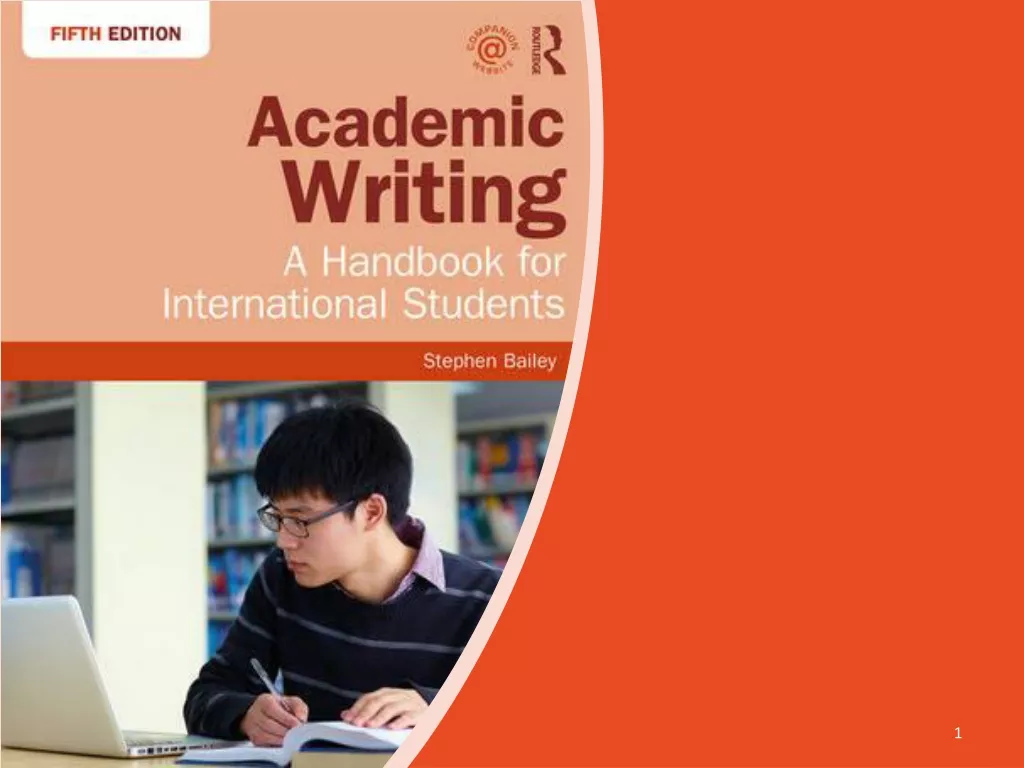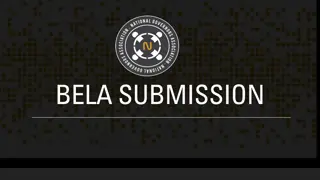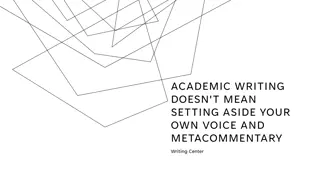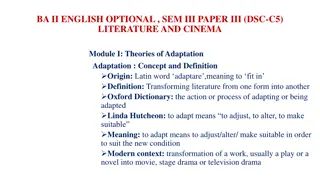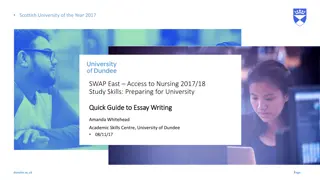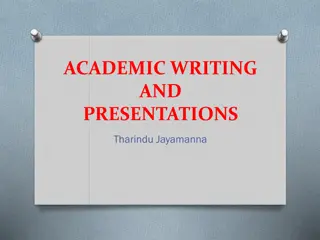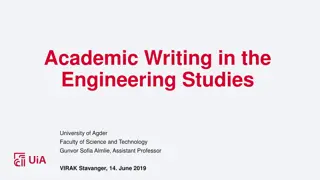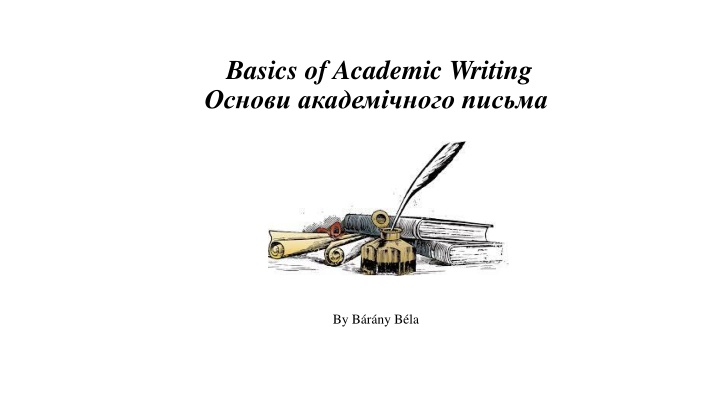
Academic Writing: Language, Definitions, Importance, and More
Explore the intricacies of academic writing, including its importance in different contexts, the definitions, characteristics, and the significance of avoiding plagiarism. Discover the various types of documents and styles used in academic writing.
Download Presentation

Please find below an Image/Link to download the presentation.
The content on the website is provided AS IS for your information and personal use only. It may not be sold, licensed, or shared on other websites without obtaining consent from the author. If you encounter any issues during the download, it is possible that the publisher has removed the file from their server.
You are allowed to download the files provided on this website for personal or commercial use, subject to the condition that they are used lawfully. All files are the property of their respective owners.
The content on the website is provided AS IS for your information and personal use only. It may not be sold, licensed, or shared on other websites without obtaining consent from the author.
E N D
Presentation Transcript
Basics of Academic Writing By B r ny B la
Importance of Academic Writing Language is a social construct that is created by the people who use it and influenced by the context in which it is used. Do you use the same language at home, at a professional meeting, and at a pub? In fact, it may be considered inappropriate. Therefore, language must change when contexts do. When contexts, you should use the language form associated to it. Academic writingng is part of it. interacting in academic
Definitions It is the process of writing analytically - the breaking down of ideas with the purpose of presenting information that depicts a clear understanding of a certain subject. Academic writing is the process of presenting ideas in a rational, organized, systematic, reasonable, and logical way.
What is academic writing? Is based on facts and data (i.e research, not opinions) Sounds formal (uses an academic vocabulary) Draws on (and therefore references) information from expert sources When we research (i.e. we find the facts and data that we want to use in our assignments), we need to be careful to take note of whose work/information we are using, so that we can acknowledge (i.e reference) their contributions. In different parts of the world, there are different approaches to how we use other people s information, and show respect to those who wrote it.
Avoiding plagiarism Plagiarism is a form of cheating. A student s writing contains plagiarism if they have done any of the following: Copied writing from someone else s work (a book, a website, another student s essay etc) Used ideas that someone else researched or developed without referencing the original source Made mistakes with their paraphrasing and referencing (such as only putting some parts of the writing into their own words)
A list of documents where academic writing is used Book reviews Essays Research report Research proposal Scientific paper Academic journal Dissertation and Thesis - These are written to obtaining an advanced degree at a college or university. Abstract - This is a short summary of a long document
Types of Academic Writing 1. Descriptive: it tells how something looks, feels, smells, tastes, and/or sounds. A good description is a word picture, the reader can imagine the object. 2. Narration: to give an account or tell the story of something, someone, or an event. Use time order to organize sentences. 3. Argumentative or Persuasive: to induce readers to believe in writer s opinions or views through appealing reasons. To convince readers.
Characteristics of Academic Writing Planning - There is a certain amount of planning before you start writing the paper analytical and organized. Outline -A proper outline is a must for academic writing. help you formulate your thoughts, make you aware of certain relationships between topics. It will help you determine the pertinent information to be included in your paper. Tone -A formal tone is used. You do not use slang words, jargon, abbreviations, or many clich s. Language - The language in your paper needs to be clear and words need to be chosen for their precision. A thesaurus is a good tool to help you pick just the right words to explain the issues. Point-of-view - The point of view in the third person, as the focus of academic writing is to educate on the facts, not support an opinion. Approach - Deductive reasoning is a big part of academic writing as your readers have to follow the path that brought you to your conclusion. Deductive reasoning and an analytical approach are important in academic writing. Much planning and forethought are needed to have a well organized paper.
At the end of the course, you will: Know: What the requirements for academic writing are. The difference between common forms of academic writing (such as essays, case studies and journal articles). Be able to: Identify in-text and end text referencing. Identify plagiarism in academic writing.
Sources Used: 1. Bailey S.Academic Writing.A Practical Guide for Students. RouthledgeFalmer, 2003. 192 p. 2. Gillett A., Hammond A., Martala M. Successful Academic Writing. Pearson Education, 2009. 334 p. 3. OshimaA., HogueA. Introduction toAcademic Writing. Pearson Education, 2007. 221 p. 4. Yakhontova T. V. EnglishAcademic Writing. Lviv, 2003. 220 p.

